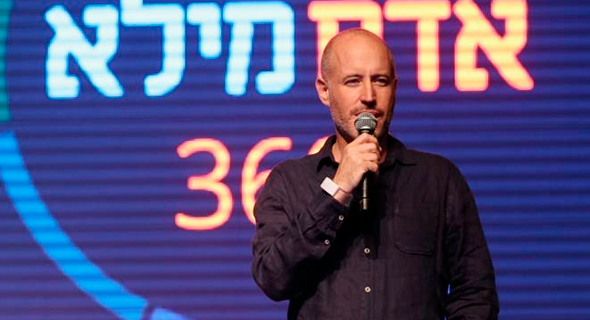Mind The Tech TLV
“Technological revolution is creating a new assessment arena in cyberspace,” says CEO
Applicants are still chosen on a face-to-face basis, but CEO Nimrod Betzer’s company has developed world-leading technologies to recruit people over cyberspace
11:4310.12.20
“There are two main technological revolutions that took place over the past few years, and go deep into the world of work and create changes in professions that are constantly being modified,” Nimrod Betzer of CEO of Adam Milo, a worldwide HR-Tech solutions provider, during Calcalist’s MindTheTech Tel Aviv 2020 Conference. “When it comes to considering which applicants should be hired for a position, there is still a technological delay. People are still hired based on an in-person interview,” he said.
 Adam Milo CEO Nimrod Betzer speaks to an audience
Adam Milo CEO Nimrod Betzer speaks to an audience
Aside from that, the second revolution, he said, is the media revolution created by meeting others virtually over a network, and can be anything from dating, renting an apartment, taking out a loan, or recruiting employees. “A virtual platform is created where people meet in cyberspace, and the human interaction disappears. Five years ago, at Adam Milo we understood these changes, and have become a world-leader diagnostic company that tests people and candidates through virtual meetings,” he said.
 Adam Milo CEO Nimrod Betzer speaks to an audience
Adam Milo CEO Nimrod Betzer speaks to an audience “We took two major steps: first we developed world-leading technologies to allow for virtual assessments. Aside from that, we addressed how to use existing methodological diagnoses in the virtual world. Those are two parallel axes that allow us to spread our abilities around the world, and we have done that. We started to test job applicants around the world, and immediately gained recognition,” Betzer added.
“The largest companies in the world, who test hundreds of thousands of applicants, mainly European companies but also from other places, recognized our capabilities. Research that we’ve done on the topic showed excellent results, and we saw that it is even better than classic testing. After our global success, we tried to figure out how we could bring that to Israel too, and set up a strategic program to transfer all of our company’s customers' tests to online diagnoses using our technological tools by 2022.”
“In March 2020 with the outbreak of the pandemic in Israel, the entire world was disrupted, and many remember the chaos of the first lockdown. The business world was in pandamonium, and many worked from home, or didn’t work at all. We made a decision to continue to conduct business with our customers. For that purpose, we adapted our business capabilities from outside of Israel, inside the country. Within two weeks, we had 1,500 customers working remotely from home, who used our technological tools. It was amazing,” he said.
“Eight months later, we look back with pride at our success. Our applicants are very satisfied, and companies are as well. Our research has shown greater results than regular diagnoses that are based on face-to-face interactions.”
“If the technology and the methodology existed, why does this process have to continue until completion up until 2022?” Betzer asked. “The answer lies in changing our point of view and coming to terms with the new altered reality. As managers, we have to dig deep to change people’s reality.”



